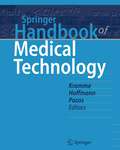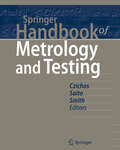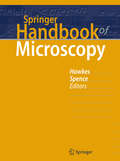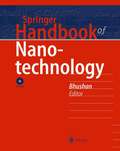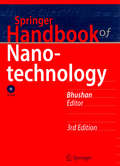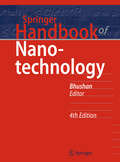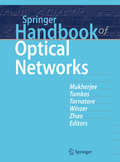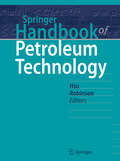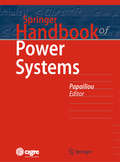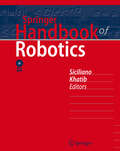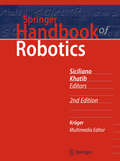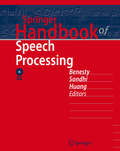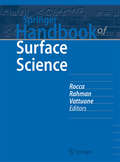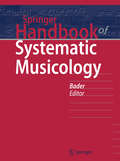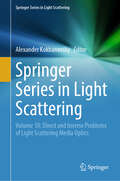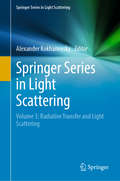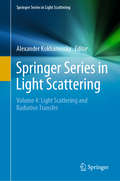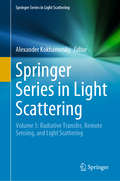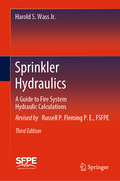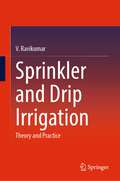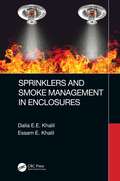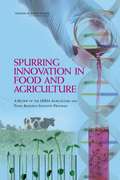- Table View
- List View
Springer Handbook of Medical Technology
by Robert Steven Pozos Klaus-Peter Hoffmann Rüdiger KrammeThis concise, user-oriented and up-to-date desk reference offers a broad introduction to the fascinating world of medical technology, fully considering today's progress and further development in all relevant fields. The Springer Handbook of Medical Technology is a systemized and well-structured guideline which distinguishes itself through simplification and condensation of complex facts. This book is an indispensable resource for professionals working directly or indirectly with medical systems and appliances every day. It is also meant for graduate and post graduate students in hospital management, medical engineering, and medical physics.
Springer Handbook of Metrology and Testing
by Tetsuya Saito Leslie E. Smith Horst CzichosThis Springer Handbook of Metrology and Testing presents the principles of Metrology - the science of measurement - and the methods and techniques of Testing - determining the characteristics of a given product - as they apply to chemical and microstructural analysis, and to the measurement and testing of materials properties and performance, including modelling and simulation. The principal motivation for this Handbook stems from the increasing demands of technology for measurement results that can be used globally. Measurements within a local laboratory or manufacturing facility must be able to be reproduced accurately anywhere in the world. The book integrates knowledge from basic sciences and engineering disciplines, compiled by experts from internationally known metrology and testing institutions, and academe, as well as from industry, and conformity-assessment and accreditation bodies. The Commission of the European Union has expressed this as there is no science without measurements, no quality without testing, and no global markets without standards.
Springer Handbook of Microscopy (Springer Handbooks)
by Peter W. Hawkes John C. H. SpenceThis book features reviews by leading experts on the methods and applications of modern forms of microscopy. The recent awards of Nobel Prizes awarded for super-resolution optical microscopy and cryo-electron microscopy have demonstrated the rich scientific opportunities for research in novel microscopies. Earlier Nobel Prizes for electron microscopy (the instrument itself and applications to biology), scanning probe microscopy and holography are a reminder of the central role of microscopy in modern science, from the study of nanostructures in materials science, physics and chemistry to structural biology.Separate chapters are devoted to confocal, fluorescent and related novel optical microscopies, coherent diffractive imaging, scanning probe microscopy, transmission electron microscopy in all its modes from aberration corrected and analytical to in-situ and time-resolved, low energy electron microscopy, photoelectron microscopy, cryo-electron microscopy in biology, and also ion microscopy. In addition to serving as an essential reference for researchers and teachers in the fields such as materials science, condensed matter physics, solid-state chemistry, structural biology and the molecular sciences generally, the Springer Handbook of Microscopy is a unified, coherent and pedagogically attractive text for advanced students who need an authoritative yet accessible guide to the science and practice of microscopy.
Springer Handbook of Nanotechnology
by Bharat BhushanThis major work has established itself as the definitive reference in the nanoscience and nanotechnology area in one volume. In presents nanostructures, micro/nanofabrication, and micro/nanodevices. Special emphasis is on scanning probe microscopy, nanotribology and nanomechanics, molecularly thick films, industrial applications and microdevice reliability, and on social aspects. Reflecting further developments, the new edition has grown from six to eight parts. The latest information is added to fields such as bionanotechnology, nanorobotics, and NEMS/MEMS reliability. This classic reference book is orchestrated by a highly experienced editor and written by a team of distinguished experts for those learning about the field of nanotechnology.
Springer Handbook of Nanotechnology
by Bharat BhushanThis major work has established itself as the definitive reference in the nanoscience and nanotechnology area in one volume. In presents nanostructures, micro/nanofabrication, and micro/nanodevices. Special emphasis is on scanning probe microscopy, nanotribology and nanomechanics, molecularly thick films, industrial applications and microdevice reliability, and on social aspects. Reflecting further developments, the new edition has grown from six to eight parts. The latest information is added to fields such as bionanotechnology, nanorobotics, and NEMS/MEMS reliability. This classic reference book is orchestrated by a highly experienced editor and written by a team of distinguished experts for those learning about the field of nanotechnology.
Springer Handbook of Nanotechnology (Springer Handbooks)
by Bharat BhushanSince 2004 the Springer Handbook of Nanotechnology has established itself as the definitive reference in the nanoscience and nanotechnology area. It integrates the knowledge from nanofabrication, nanodevices, nanomechanics, Nanotribology, materials science, and reliability engineering in just one volume. Beside the presentation of nanostructures, micro/nanofabrication, and micro/nanodevices, special emphasis is on scanning probe microscopy, nanotribology and nanomechanics, molecularly thick films, industrial applications and microdevice reliability, and on social aspects. In its 2nd edition, the book grew from 6 to 8 parts and from 38 to 58 chapters. More information is added to field such as bionanotechnology, nanorobotics, and MEMS/NEMS reliability. The book is organized by an experienced editor with a universal knowledge and written by an international team of over 150 distinguished experts. It addresses mechanical and electrical engineers, materials scientists, physicists and chemists who work either in the nano area or in a field that is or will be influenced by this new key technology. From the reviews of the first edition:"The strong point is its focus on many of the practical aspects of nanotechnology. . . Anyone working in or learning about the field of nanotechnology would find this and excellent working handbook. '' IEEE Electrical Insulation MagazineMaterials World:"Outstandingly succeeds in its aim… It really is a magnificent volume and every scientific library and nanotechnology group should have a copy. " Materials World"The integrity and authoritativeness… is guaranteed by an experienced editor and an international team of authors which have well summarized in their chapters information on fundamentals and applications. " Polymer News
Springer Handbook of Nanotechnology, 1st Ed.
by Bharat BhushanThis major work has established itself as the definitive reference in the nanoscience and nanotechnology area in one volume. In presents nanostructures, micro/nanofabrication, and micro/nanodevices. Special emphasis is on scanning probe microscopy, nanotribology and nanomechanics, molecularly thick films, industrial applications and microdevice reliability, and on social aspects. Reflecting further developments, the new edition has grown from six to eight parts. The latest information is added to fields such as bionanotechnology, nanorobotics, and NEMS/MEMS reliability. This classic reference book is orchestrated by a highly experienced editor and written by a team of distinguished experts for those learning about the field of nanotechnology.
Springer Handbook of Optical Networks (Springer Handbooks)
by Ioannis Tomkos Massimo Tornatore Yongli Zhao Biswanath Mukherjee Peter WinzerThis handbook is an authoritative, comprehensive reference on optical networks, the backbone of today’s communication and information society. The book reviews the many underlying technologies that enable the global optical communications infrastructure, but also explains current research trends targeted towards continued capacity scaling and enhanced networking flexibility in support of an unabated traffic growth fueled by ever-emerging new applications. The book is divided into four parts: Optical Subsystems for Transmission and Switching, Core Networks, Datacenter and Super-Computer Networking, and Optical Access and Wireless Networks. Each chapter is written by world-renown experts that represent academia, industry, and international government and regulatory agencies. Every chapter provides a complete picture of its field, from entry-level information to a snapshot of the respective state-of-the-art technologies to emerging research trends, providing something useful for the novice who wants to get familiar with the field to the expert who wants to get a concise view of future trends.
Springer Handbook of Petroleum Technology
by Chang Samuel Hsu Paul R. RobinsonThis handbook provides a comprehensive but concise reference resource for the vast field of petroleum technology. Built on the successful book "Practical Advances in Petroleum Processing" published in 2006, it has been extensively revised and expanded to include upstream technologies. The book is divided into four parts: The first part on petroleum characterization offers an in-depth review of the chemical composition and physical properties of petroleum, which determine the possible uses and the quality of the products. The second part provides a brief overview of petroleum geology and upstream practices. The third part exhaustively discusses established and emerging refining technologies from a practical perspective, while the final part describes the production of various refining products, including fuels and lubricants, as well as petrochemicals, such as olefins and polymers. It also covers process automation and real-time refinery-wide process optimization. Two key chapters provide an integrated view of petroleum technology, including environmental and safety issues. Written by international experts from academia, industry and research institutions, including integrated oil companies, catalyst suppliers, licensors, and consultants, it is an invaluable resource for researchers and graduate students as well as practitioners and professionals.
Springer Handbook of Power Systems (Springer Handbooks)
by Konstantin O. PapailiouThis handbook offers a comprehensive source for electrical power professionals. It covers all elementary topics related to the design, development, operation and management of power systems, and provides an insight from worldwide key players in the electrical power systems industry.Edited by a renowned leader and expert in Power Systems, the book highlights international professionals’ longstanding experiences and addresses the requirements of practitioners but also of newcomers in this field in finding a solution for their problems.The structure of the book follows the physical structure of the power system from the fundamentals through components and equipment to the overall system. In addition the handbook covers certain horizontal matters, for example "Energy fundamentals", "High voltage engineering", and "High current and contact technology" and thus intends to become the major one-stop reference for all issues related to the electrical power system.
Springer Handbook of Robotics
by Oussama Khatib Bruno SicilianoWith the science of robotics undergoing a major transformation just now, Springer's new, authoritative handbook on the subject couldn't have come at a better time. Having broken free from its origins in industry, robotics has been rapidly expanding into the challenging terrain of unstructured environments. Unlike other handbooks that focus on industrial applications, the Springer Handbook of Robotics incorporates these new developments. Just like all Springer Handbooks, it is utterly comprehensive, edited by internationally renowned experts, and replete with contributions from leading researchers from around the world. The handbook is an ideal resource for robotics experts but also for people new to this expanding field.
Springer Handbook of Robotics (Springer Handbooks)
by Oussama Khatib Bruno SicilianoThe second edition of this handbook provides a state-of-the-art cover view on the various aspects in the rapidly developing field of robotics. Reaching for the human frontier, robotics is vigorously engaged in the growing challenges of new emerging domains. Interacting, exploring, and working with humans, the new generation of robots will increasingly touch people and their lives. The credible prospect of practical robots among humans is the result of the scientific endeavour of a half a century of robotic developments that established robotics as a modern scientific discipline. The ongoing vibrant expansion and strong growth of the field during the last decade has fueled this second edition of the Springer Handbook of Robotics. The first edition of the handbook soon became a landmark in robotics publishing and won the American Association of Publishers PROSE Award for Excellence in Physical Sciences & Mathematics as well as the organization's Award for Engineering & Technology. The second edition of the handbook, edited by two internationally renowned scientists with the support of an outstanding team of seven part editors and more than 200 authors, continues to be an authoritative reference for robotics researchers, newcomers to the field, and scholars from related disciplines. The contents have been restructured to achieve four main objectives: the enlargement of foundational topics for robotics, the enlightenment of design of various types of robotic systems, the extension of the treatment on robots moving in the environment, and the enrichment of advanced robotics applications. Further to an extensive update, fifteen new chapters have been introduced on emerging topics, and a new generation of authors have joined the handbook's team. A novel addition to the second edition is a comprehensive collection of multimedia references to more than 700 videos, which bring valuable insight into the contents. The videos can be viewed directly augmented into the text with a smartphone or tablet using a unique and specially designed app.
Springer Handbook of Speech Processing
by M. M. Sondhi Jacob Benesty Yiteng HuangThis handbook plays a fundamental role in sustainable progress in speech research and development. With an accessible format and with accompanying DVD-Rom, it targets three categories of readers: graduate students, professors and active researchers in academia, and engineers in industry who need to understand or implement some specific algorithms for their speech-related products. It is a superb source of application-oriented, authoritative and comprehensive information about these technologies, this work combines the established knowledge derived from research in such fast evolving disciplines as Signal Processing and Communications, Acoustics, Computer Science and Linguistics.
Springer Handbook of Surface Science (Springer Handbooks)
by Mario Rocca Talat S. Rahman Luca VattuoneThis handbook delivers an up-to-date, comprehensive and authoritative coverage of the broad field of surface science, encompassing a range of important materials such metals, semiconductors, insulators, ultrathin films and supported nanoobjects.Over 100 experts from all branches of experiment and theory review in 39 chapters all major aspects of solid-state surfaces, from basic principles to applications, including the latest, ground-breaking research results. Beginning with the fundamental background of kinetics and thermodynamics at surfaces, the handbook leads the reader through the basics of crystallographic structures and electronic properties, to the advanced topics at the forefront of current research. These include but are not limited to novel applications in nanoelectronics, nanomechanical devices, plasmonics, carbon films, catalysis, and biology.The handbook is an ideal reference guide and instructional aid for a wide range of physicists, chemists, materials scientists and engineers active throughout academic and industrial research.
Springer Handbook of Systematic Musicology (Springer Handbooks)
by Rolf BaderThis unique reference book offers a holistic description of the multifaceted field of systematic musicology, which is the study of music, its production and perception, and its cultural, historical and philosophical background. The seven sections reflect the main topics in this interdisciplinary subject. The first two parts discuss musical acoustics and signal processing, comprehensively describing the mathematical and physical fundamentals of musical sound generation and propagation. The complex interplay of physiology and psychology involved in sound and music perception is covered in the following sections, with a particular focus on psychoacoustics and the recently evolved research on embodied music cognition. In addition, a huge variety of technical applications for professional training, music composition and consumer electronics are presented. A section on music ethnology completes this comprehensive handbook. Music theory and philosophy of music are imbedded throughout. Carefully edited and written by internationally respected experts, it is an invaluable reference resource for professionals and graduate students alike.
Springer Series in Light Scattering: Volume 10: Direct and Inverse Problems of Light Scattering Media Optics (Springer Series in Light Scattering)
by Alexander KokhanovskyThe book is aimed at description of recent progress in studies of light scattering in turbid media In particular, atmospheric optics and remote sensing research community will greatly benefit from the publication of this book.
Springer Series in Light Scattering: Volume 3: Radiative Transfer and Light Scattering (Springer Series in Light Scattering)
by Alexander KokhanovskyThis book presents a survey of modern theoretical techniques in studies of radiative transfer and light scattering phenomena in turbid media. It offers a comprehensive analysis of polarized radiative transfer, and also discusses advances in planetary spectroscopy as far as aerosol layer height determination is of interest. Further, it describes approximate methods of the radiative transfer equation solution for a special case of strongly scattering media. A separate chapter focuses on optical properties of Black Carbon aggregates.
Springer Series in Light Scattering: Volume 4: Light Scattering and Radiative Transfer (Springer Series in Light Scattering)
by Alexander KokhanovskyThis book describes recent advances in radiative transfer, atmospheric remote sensing, polarization optics of random media, and light scattering. It is a valuable resource for anyone involved in light scattering research. Providing numerous step-by-step tutorials, it allows readers to quickly learn about various aspects of theoretical and experimental light scattering media optics. The book features among others a chapter on aerosol remote sensing that helps readers to define and solve various aerosol remote sensing problems.
Springer Series in Light Scattering: Volume 5: Radiative Transfer, Remote Sensing, and Light Scattering (Springer Series in Light Scattering)
by Alexander KokhanovskyThis book reviews the spaceborne and airborne remote sensing of clouds including cloud lidar and radar data analysis, snow and soil reflectance spectroscopy, and single light scattering by nonspherical scatterers. Providing deep insights into the latest technologies, it is a valuable resource for scientists and postgraduate students alike.
Springfield Firefighting (Images of America)
by Fred Rodriguez Bert D. Johanson Nancy B. JohansonThe history of the Springfield Fire Department dates back to 1792 when the first hand pumper, Lion, was purchased. On January 24, 1794, a fire club with 50 members, all prominent citizens of the city, was organized. Fire districts were established in 1830 by an act passed by the Massachusetts legislature. By 1833, Springfield officially organized a fire department, and like the fire club, the new volunteer department consisted of prominent members of the community. The fire department changed from volunteer to paid in 1872. The volunteers then formed the Springfield Veteran Fireman's Association. After 1872, the department made great strides, especially in the area of apparatus. In 1906, Springfield entered the motorized age with the introduction of a Knox squad truck, and by 1916, Springfield became the first fullymotorized fire department in the United States.
Springtime at Cannon Hall Farm
by The Nicholson FamilyThe instant no. 2 Sunday Times bestseller!Join the Nicholson family for this heartwarming journey through a typical springtime on their South Yorkshire farm.Throughout the book they reflect on the childhood stories, testing times, poignant memories and enriching experiences that have shaped the lives they lead today. With the coming of a new season, Roger and Cynthia Nicholson and their sons Richard, Robert and David show how the farming year is shaped around the arrival of baby goats, lambs, calves and piglets galore.As Yorkshire's premier open farm attraction, Cannon Hall Farm continues to play host to thousands of visitors and spring is the busiest time of the year. People flock to meet the new arrivals and catch up with old favourites such as the llama and alpaca posse, the stunning shire horses and the irrepressible Shetland ponies, including Ozzy Horsebourne and Jon Bon Pony.Along with all the animal antics, Springtime at Cannon Hall Farm features tales of bygone days when traditional skills, crafts and daily practices shaped life in the countryside. And for fans of Rob and Dave's Channel 5 shows, there are lots of behind-the-scenes secrets you won't want to miss...
Sprinkler Hydraulics: A Guide to Fire System Hydraulic Calculations
by Harold S. Wass Jr. Russell P. Fleming P.E.This is the foremost guide to hydraulically designing sprinkler systems for commercial and residential buildings. Sprinkler Hydraulics, Third Edition includes the latest developments in automatic sprinkler design, as well as going beyond the NFPA 13 Standard to explain everything needed to know to professionally design a system. Sprinkler Hydraulics, Third Edition explains flow phenomena to help the reader evaluate calculated sprinkler systems. Starting with a general discussion of the mathematics involved, the discussion proceeds to define sprinkler density, including several examples which explain how to determine discharge areas.• Includes the latest developments in automatic sprinkler design, as well as going beyond the NFPA 13 Standard to explain everything needed to know to professionally design a system;• Starting with a general discussion of the mathematics involved, the discussion proceeds to define sprinkler density, including several examples which explain how to determine discharge areas;• Explains flow phenomena to help the reader evaluate calculated sprinkler systems.
Sprinkler and Drip Irrigation: Theory and Practice
by V. RavikumarThis textbook is a comprehensive volume on sprinklers and drip irrigation and covers all the basic and fundamentals concepts related to these topics. It is the first book to consider relative-flow-ratio as an evaluation criterion for both sprinkler and drip irrigation designs. It also discusses various types of sprinklers (used for irrigation), their complex layouts, design methodologies, selection criteria explained with practical examples, and their operations and maintenance under different conditions. In addition to operation and maintenance of drip irrigation components, the book also explains the drip irrigation hydraulics and various design aspects and the effect of the same on their performance. It also has one important chapter on Rhizosphere modelling which introduces the state-of-the-art technologies in optimal irrigation and fertigation scheduling. Worked out examples and solved problems in the chapters would aid to learning and understanding of the topic among the students. Given the contents, the book will be extremely useful for the undergraduate and postgraduate students of agriculture engineering, irrigation engineering and civil engineering. This textbook will also be useful for researchers, engineers and professionals working in these areas.
Sprinklers and Smoke Management in Enclosures
by Essam E. Khalil Dalia E.E. KhalilThis book addresses smoke management in enclosures and provides a platform for understanding the principles of smoke propagation and spread, heat release rate, and the effect of sprinklers on suppression. Considering how sprinkler systems have become a vital part of firefighting systems in enclosures, the book evaluates the effect of sprinkler activation on the behavior of fire-induced smoke and the interaction of water particles with the smoke layer. It studies two base case models where the sprinklers’ effect on the fire curve was considered. This base case was assessed with two smoke extraction systems, namely, a ducted system and an impulse ventilation system. By focusing on key elements, such as visibility, ceiling height, and fire curve, the results of the study will be of interest to mechanical engineers, HVAC professionals, and fire safety professionals and investigators. Features Includes case models and scenarios to evaluate real examples from different applications Studies the effect of sprinkler activation on the behavior of fire-induced smoke Explores various factors, such as ceiling height, sprinkler operating pressure, and fire curve Discusses the interaction of water particles with the smoke layer Utilizes Pyrosim software for CFD modeling
Spurring Innovation in Food and Agriculture: A Review of the USDA Agriculture and Food Research Initiative Program
by Committee on a Review of the USDA Agriculture Food Research InitiativeThe United States embarked on bold polices to enhance its food and agricultural system during the last half of the 19th century, investing first in the education of people and soon thereafter in research and discovery programs aimed at acquiring new knowledge needed to address the complex challenges of feeding a growing and hungry nation. Those policies, sustained over 125 years, have produced the most productive and efficient agricultural and food system in history. The U. S. Department of Agriculture (USDA) is the primary agency responsible for supporting innovations and advances in food and agriculture. USDA funds are allocated to support research through several mechanisms, including the Agriculture and Food Research Initiative (AFRI). In 2008, Congress replaced USDA's National Research Initiative with AFRI, creating USDA's flagship competitive research grants program, and the 2008 Food, Conservation, and Energy Act, known as the Farm Bill, outlined the structure of the new program. "Spurring Innovation in Food and Agriculture" assesses the effectiveness of AFRI in meeting the goals laid out by Congress and its success in advancing innovations and competitiveness in the U. S. food and agriculture system. "Spurring Innovation in Food and Agriculture" evaluates the value, relevance, quality, fairness, and flexibility of AFRI. This report also considers funding policies and mechanisms and identifies measures of the effectiveness and efficiency of AFRI's operation. The study examines AFRI's role in advancing science in relation to other research and grant programs inside of USDA as well as how complementary it is to other federal research and development programs. The findings and conclusions of this report will help AFRI improve its functions and effectiveness in meeting its goals and outcomes.
